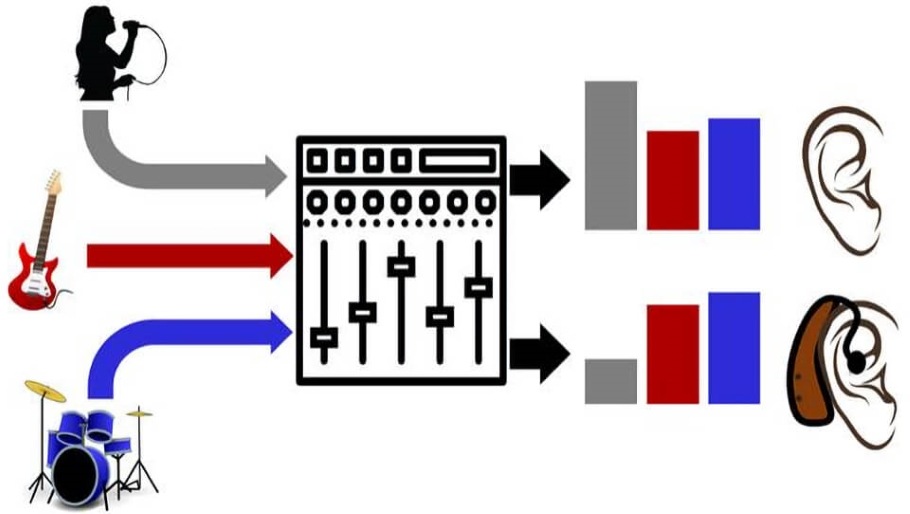Hard-of-hearing Prefer a Different Sound When It Comes to Music
Author: American Institute of Physics
Published: 2023/08/22 - Updated: 2025/08/25
Publication Details: Peer-Reviewed, Research Paper
Category Topic: Deaf Communication - Related Publications
Page Content: Synopsis - Introduction - Main - Insights, Updates
Synopsis: This research examines differences in music mixing preferences between normal-hearing and hard-of-hearing listeners, published as a peer-reviewed study in the Journal of the Acoustical Society of America by researchers from the University of Oldenburg. The information is authoritative because it represents rigorous academic research published in a leading acoustics journal, providing evidence-based insights into how hearing loss affects musical enjoyment and accessibility. The study found that hard-of-hearing listeners prefer louder lead vocals, higher frequencies, and sparser mixes with fewer overall frequencies compared to normal-hearing listeners, which has significant implications for music production and assistive technology design. This research is particularly valuable for people with disabilities, audio engineers, and hearing aid users, as it demonstrates concrete ways that music mixing could be adapted to improve accessibility for millions of listeners worldwide who experience hearing loss - Disabled World (DW).
Introduction
"Exploring Level and Spectrum Based Music Mixing Transforms for Hearing-Impaired Listeners" - Authored by Aravindan Joseph Benjamin and Kai Siedenburg - Journal of the Acoustical Society of America.
Millions of people around the world experience some form of hearing loss, resulting in negative impacts to their health and quality of life. Treatments exist in the form of hearing aids and cochlear implants, but these assistive devices cannot replace the full functionality of human hearing and remain inaccessible for most people. Auditory experiences, such as speech and music, are affected the most.
Main Content
In JASA, published on behalf of the Acoustical Society of America by AIP Publishing, researchers from the University of Oldenburg studied the impact of hearing loss on subjects' enjoyment of different music mixes.
Modern pop or rock music is built from several individual tracks, such as vocals, instruments, and synthesized sounds, all recorded separately and mixed to make the final product. To cater to listener preferences, this mixing might entail raising or lowering the volume of one of the tracks or amplifying the high- or low-frequency sounds.
"Mixing is tailored to suit the needs of normal-hearing listeners," said author Kai Siedenburg. "We wanted to explore whether there are actually differences in mixing preferences between normal-hearing and hard-of-hearing listeners."
To do this, the researchers played different music mixes to listeners with and without hearing loss. They found that those with hearing loss preferred louder lead vocals, higher frequencies, and sparser mixes with fewer frequencies overall.
"Generally, hard-of-hearing listeners have reduced frequency selectivity and impaired level perception," said author Aravindan Benjamin. "They tend to prefer louder levels of lead vocals compared to normal listeners."

Previous research from the group has found that music steadily shifted to quieter vocals and louder instrumentals leading up to 1975 and has remained there, meaning today's music may be less accessible to those with hearing loss.
Use of hearing aids can remedy these issues to a degree, but they are not available to many people with hearing loss and come with their own set of problems. Some users might prefer to adjust their music with software rather than listen to the default mix through hearing aids.
"Getting good headphones, for example, and then playing around with the equalization might be a better approach than trying to squeeze everything through the hardware of the hearing aid," said Siedenburg.
Ultimately, the biggest difference must come from the production side. Sound engineers with access to the individual tracks can make a big difference by making their work more accessible to millions of listeners.
"One approach could be to offer a couple of different mixes, one for the general public and one for people who are moderately hard of hearing," said Siedenburg. "Certain adjustments to the mix might help to cater to the needs of this group of people in a better way."
Journal of the Acoustical Society of America (JASA)
The Journal of the Acoustical Society of America (JASA) is published on behalf of the Acoustical Society of America. Since 1929, the journal has been the leading source of theoretical and experimental research results in the broad interdisciplinary subject of sound.
JASA serves physical scientists, life scientists, engineers, psychologists, physiologists, architects, musicians, and speech communication specialists.
Acoustical Society of America (ASA)
The Acoustical Society of America (ASA) is the premier international scientific society in acoustics devoted to the science and technology of sound. Its 7,000 members worldwide represent a broad spectrum of the study of acoustics.
ASA publications include The Journal of the Acoustical Society of America (the world's leading journal on acoustics), JASA Express Letters, Proceedings of Meetings on Acoustics, Acoustics Today magazine, books, and standards on acoustics. The society also holds two major scientific meetings each year.
Insights, Analysis, and Developments
Editorial Note: The implications of this research extend far beyond academic interest, pointing toward a future where inclusive audio design becomes standard practice rather than an afterthought. With digital streaming platforms now capable of delivering personalized audio experiences, the technical barriers to offering multiple mix versions have largely disappeared, leaving only the creative and commercial will to implement such changes. The study's findings challenge the music industry to recognize that accessibility improvements often benefit broader audiences, as clearer vocals and thoughtful frequency management can enhance listening experiences for everyone, not just those with hearing impairments - Disabled World (DW).Attribution/Source(s): This peer reviewed publication was selected for publishing by the editors of Disabled World (DW) due to its relevance to the disability community. Originally authored by American Institute of Physics and published on 2023/08/22, this content may have been edited for style, clarity, or brevity.